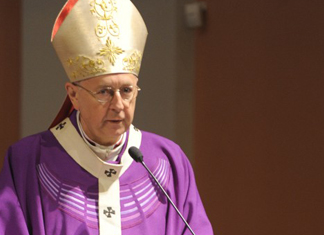The Episcopate’s President: Cardinal Wyszynski’s Heroic Attitude in Face of Persecutors


BP KEP
“Cardinal Wyszynski’s attitude was truly heroic in relation to those who imprisoned him or caused other forms of suffering,” said Archbishop Stanisław Gądecki 23 June 2021 in Warsaw. The Episcopate’s President spoke at the symposium on “Cardinal Stefan Wyszyński and Mother Elżbieta Róża Czacka – Teachers and Witnesses of the Love of God, Neighbor, and Homeland.” The beatification of these great figures of the Church in Poland will take place on September 12th, in Warsaw.
In his intervention, Archbishop Gądecki pointed to Card. Wyszynski’s ability to forgive his enemies. He recalled, among others things, his reaction to the death of Bolesław Bierut, who issued the warrant for his arrest. The Primate noted: “I want to pray for God’s mercy for the man who hurt me; tomorrow I will celebrate Holy Mass. for the deceased. Already now I forgive the man who did me wrong, trusting that the God of justice will find brighter deeds in his life that will gain God’s mercy.”
The Metropolitan of Poznań mentioned that the Primate had two cards in his breviary: one contained the names of all priests who had abandoned the priesthood and for whom he prayed every day, and the other had the name of Bolesław Bierut. “I pray for him every day because he was a man who made bad choices in his life but was not actually a bad man,” said Archbishop Gądecki quoting Cardinal Wyszyński.
The President of the Polish Bishops’ Conference also noted that the Primate included intentions for people who were harming the nation.
“The life of the Primate, in the times of Stalinist and Gomułka, especially his imprisonment, recalls the behavior of the martyrs in the first centuries of the Church,” emphasized Archbishop Gądecki, adding that this attitude was confirmed by the notes that the Cardinal always kept up to date.
The President of the Polish Bishops’ Conference pointed out that although the Primate was not a professional politician or diplomat and did not seek power, he was widely regarded as an outstanding statesman, not only by Catholics but also by Poles in general. During the communist period, recalled Archbishop Gądecki, the Primate was considered the only public authority and someone who publicly articulated the will of the society.
“It was he who strengthened his countrymen’s inner freedom, sense of dignity, who strengthened their faith and national identity, and showed them how to build the social life,” said the President of Polish Bishops’ Conference. And then, when Solidarity broke out, he calmed tensions, fearing that his brother’s blood would be spilled, and mediated between trade unionists and the authorities,” he recalled.
Archbishop Gądecki emphasized that Primate Wyszyński led the Church and the nation through one of the most difficult moments in its history. “He passed away when the Poles, supported spiritually by the Polish Pope, could already claim to live in truth and freedom,” said the President of the Polish Bishops’ Conference.
The symposium “Cardinal Stefan Wyszyński and Mother Elżbieta Róża Czacka – Teachers and Witnesses of the Love of God, Neighbor, and Homeland” is taking place at the House of the Archbishops of Warsaw. Historians and associates of Cardinal Wyszynski as well as Sisters from the congregation founded by Mother Czacka and journalists are gathered for this meeting.
The event is co-organized by the Catholic Information Agency. The honorary patronage over the session was assumed by the President of the Republic of Poland, Andrzej Duda.




Dodaj komentarz